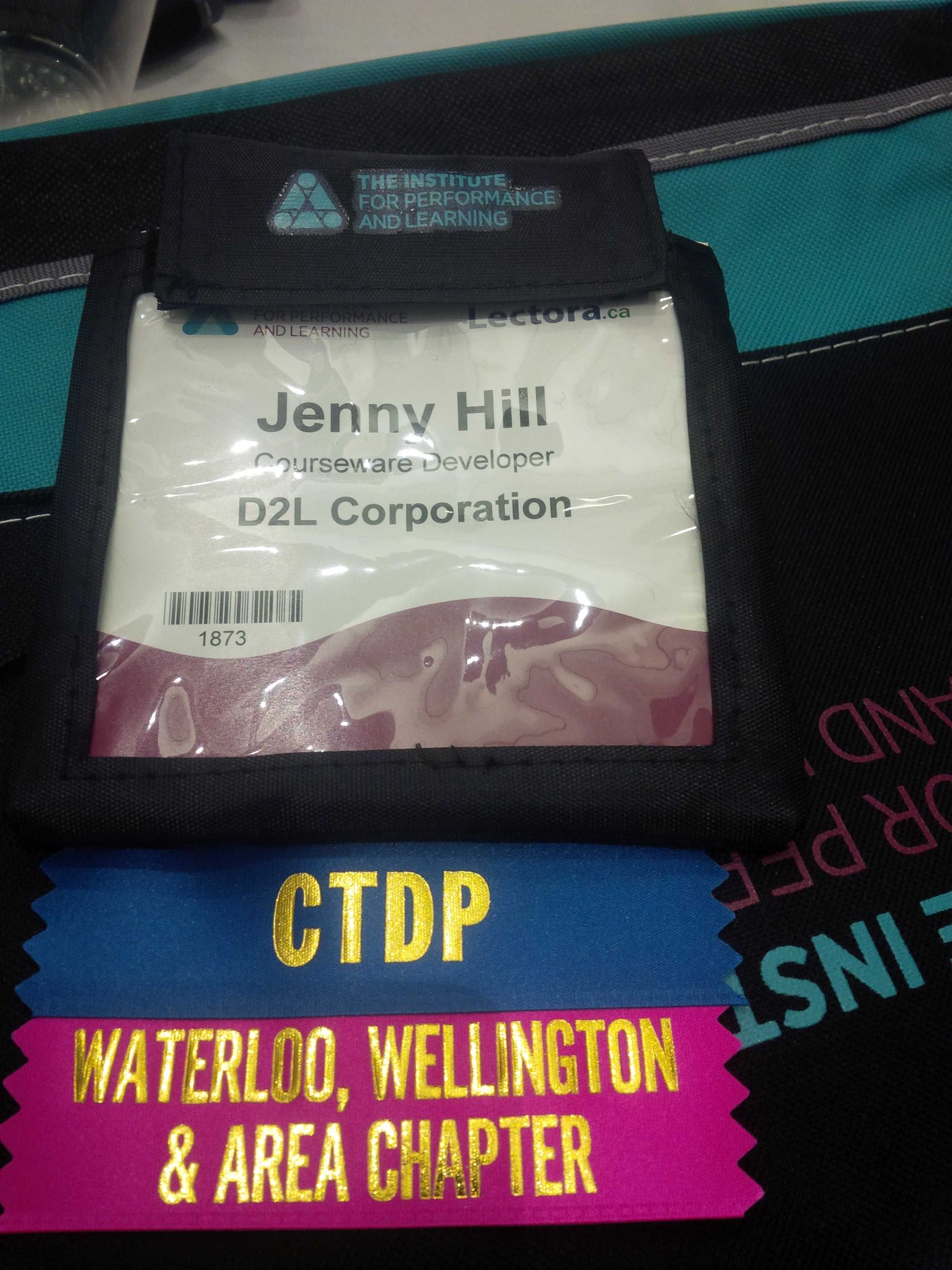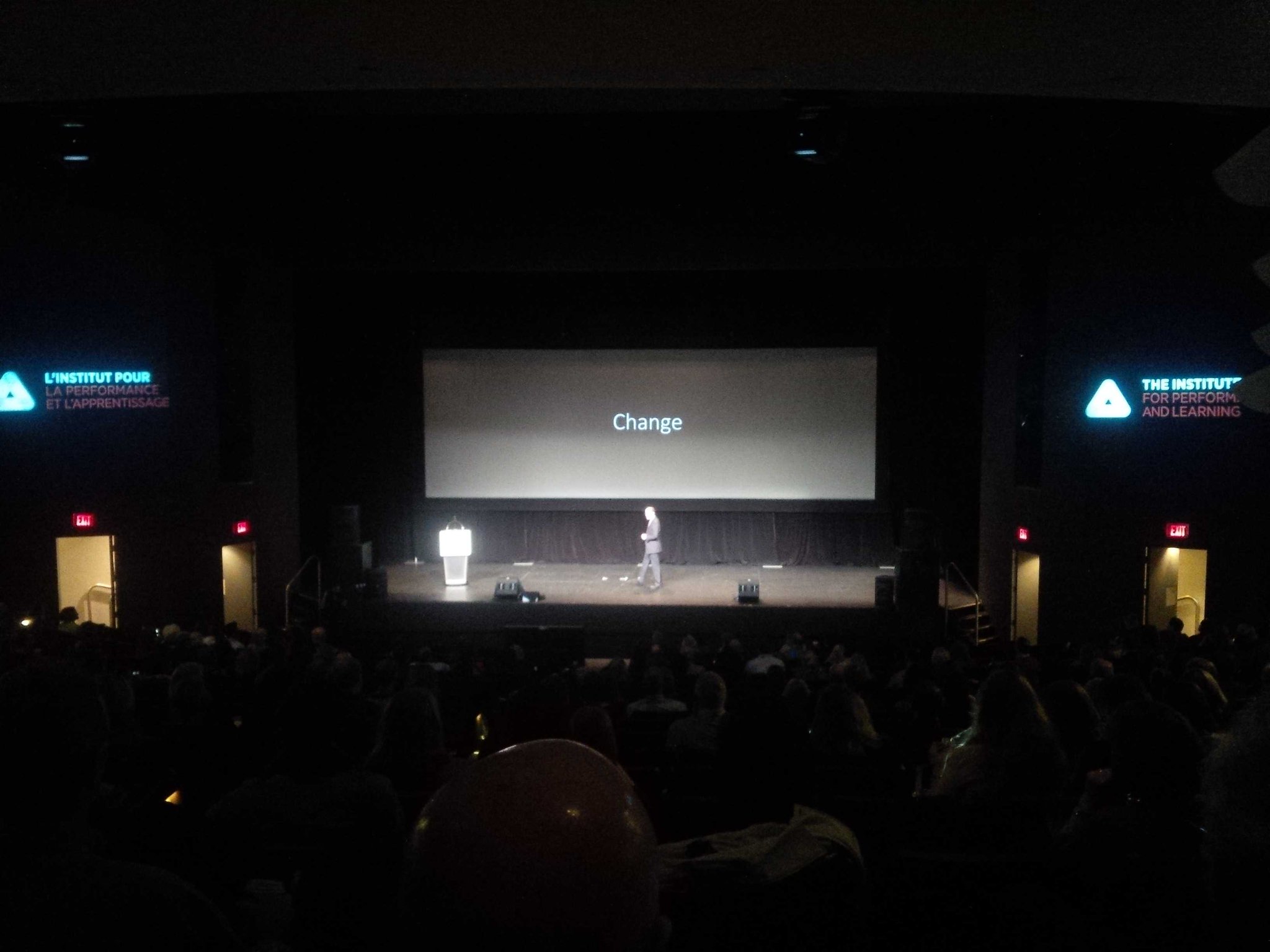Institute for Performance and Learning Conference: Days 1 and 2
 Well! Â What an amazing two days I’ve had at the Institute for Performance and Learning Conference in Toronto! Â This is my first time attending this conference, and so far, it hasn’t disappointed!
Well! Â What an amazing two days I’ve had at the Institute for Performance and Learning Conference in Toronto! Â This is my first time attending this conference, and so far, it hasn’t disappointed!
I want to highlight some of the big key takeaways that I’ve had so far!
Instructional Design is a lot like Marketing
So much of what I’m seeing lately is leading me back to drawing on marketing expertise. How do you engage customers (learners)? Â How do you help them solve problems? Â How do you demonstrate the benefits of what they’re doing? Â What pulls them in? Â What builds habits? Â There’s a ton of parallels.
Senior Leadership
The importance of senior leadership buy-in came up again and again. Â In building a learning culture, it’s important that leaders jump in and walk the talk. In adopting new technologies, new ways of interacting, of capturing knowledge- when the leaders participate, others are so much more likely to follow and plans become so much more successful. Â Getting the buy in and making that business case may be more important than ever in an age when over 70% of changes fail.
Elearning is old, and new
There are a lot of industries and organizations who are still coming around to the idea of delivering more learning through online avenues. Â And there’s also a lot of ancient elearning out there giving good elearning a bad name. Â Many in the industry are still struggling to successfully incorporate blended learning techniques. Â Because so many people have had bad experiences with elearning as well, the bar has been raised- it’s tough to really surprise and wow a learner when they expect yet another “click next” with tiny text and no interaction required.
People are hungry for stories of overcoming challenges
I’ve heard so much good feedback about a few sessions that particularly highlighted challenges that learning and development teams overcame. Â I think this is one of the biggest ways that people can connect and truly learn from each other- Learn from my mistakes, and maybe you won’t have to learn things the hard way!
Get at the knowledge in the room!
Capturing expertise and knowledge is so important yet so many of us struggle to do that. Â I learned some great new techniques for capturing best practices, for engaging every single participant to add to the discussion, and for helping others to share. Â So much awesome skill and knowledge, we can’t keep it all locked up in people’s heads!
Business Relevancy- More important than ever
Many are struggling with budget cuts, unsupportive leadership, and more obstacles- but it seems that staying relevant and demonstrating that will become more and more important. Businesses need to stay on top of trends, meet objectives, and overall- make money. Demonstrating how we can positively influence those things will keep L&D at the top of the list of critical roles in tomorrow’s businesses.
Change
There’s so much change in just about every industry, which means that learning and development is broadly affected. Â There’s major shifts in organizations, in the overall jobs culture, speed of change (hint: it’s getting faster). Add a thick layer of new technology on top, and there are many employees and learners out there who are frozen and not sure how to move forward. Â I think my big takeaway is that knowing that change isn’t going away, and that nothing is slowing down- I want our industry to get ahead of it and LEAD the change, not just help everyone else cope.


With the movement of jobs odstiue the US, you have to think of what kind of jobs are leaving; usually low skilled jobs, and those jobs are not coming back. Sadly as well, most Americans don’t want to do those jobs for the money that people here are willing to pay. Look at the people mowing our lawns and cleaning houses? Are they Americans . No. Most Americans would rather get their 99 weeks of unemployment and complain that Obama doesn’t do more about jobs. With internationalization’ this is inevitable. The markets will find a way to exploit any pricing inequities so lower skilled jobs go elsewhere. Companies are driven to make money. Pure and simple, and its not bad. Just what is. If we don’t want corporations to make money, then maybe we should live in a communistic society where we can all have a job, all have healthcare, and all have plenty food to eat and a place to live. Given all that, the pressure on HR in the US is incredible due to the skills of workers needed and the lack of them around. When I talk to my HR Manager, I tell them I want all of their activities to focus around 3 objectives. 1. Find the best people for the positions we have. 2. Train them to be their best. 3. Do what it takes to keep the best at our company. That’s a tough job! Especially #3. Since highly skilled workers are in demand, and with little loyalty in today’s workforce, keeping the good ones is a challenge.